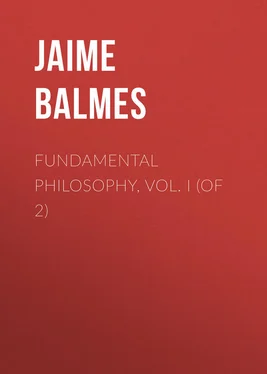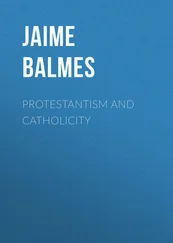Jaime Balmes - Fundamental Philosophy, Vol. I (of 2)
Здесь есть возможность читать онлайн «Jaime Balmes - Fundamental Philosophy, Vol. I (of 2)» — ознакомительный отрывок электронной книги совершенно бесплатно, а после прочтения отрывка купить полную версию. В некоторых случаях можно слушать аудио, скачать через торрент в формате fb2 и присутствует краткое содержание. Жанр: foreign_antique, foreign_prose, на английском языке. Описание произведения, (предисловие) а так же отзывы посетителей доступны на портале библиотеки ЛибКат.
- Название:Fundamental Philosophy, Vol. I (of 2)
- Автор:
- Жанр:
- Год:неизвестен
- ISBN:нет данных
- Рейтинг книги:3 / 5. Голосов: 1
-
Избранное:Добавить в избранное
- Отзывы:
-
Ваша оценка:
- 60
- 1
- 2
- 3
- 4
- 5
Fundamental Philosophy, Vol. I (of 2): краткое содержание, описание и аннотация
Предлагаем к чтению аннотацию, описание, краткое содержание или предисловие (зависит от того, что написал сам автор книги «Fundamental Philosophy, Vol. I (of 2)»). Если вы не нашли необходимую информацию о книге — напишите в комментариях, мы постараемся отыскать её.
Fundamental Philosophy, Vol. I (of 2) — читать онлайн ознакомительный отрывок
Ниже представлен текст книги, разбитый по страницам. Система сохранения места последней прочитанной страницы, позволяет с удобством читать онлайн бесплатно книгу «Fundamental Philosophy, Vol. I (of 2)», без необходимости каждый раз заново искать на чём Вы остановились. Поставьте закладку, и сможете в любой момент перейти на страницу, на которой закончили чтение.
Интервал:
Закладка:
62. Why are we sure that the agreeable sensation which we experience in our sense of smell proceeds from an object called a rose ? Because we recollect having experienced the same sensation on a thousand other occasions; because both sight and touch confirm the testimony of smell. But how do we know that these sensations are something beside the impressions received in our soul? Why may we not believe them to come from some cause or other, without relation to external causes? Is it because other men say the contrary? Are we certain that they exist? How do they know what they tell us? How do we know that we hear rightly? There is the same difficulty with the other senses as with that of hearing, and if we doubt the testimony of three senses, why shall we not doubt that of four? Reasoning is here of no avail; it would lead us to cavils which would require an impassible doubt, and would tear from us a security, of which, notwithstanding all our efforts, we cannot despoil ourselves.
Moreover, if we appeal to the principles of reason, in order to prove the truth of sensation, we leave the territory of sensations, and do not place in them the primitive truth, origin of all other truths, nor accomplish what we undertook.
63. Hence it follows: First, that there is no one sensation which is the origin of the certainty of all others; this we have only indicated here, reserving the demonstration of it to our treatise on sensations. Secondly, although such a sensation were to exist, it could not serve as the basis of any thing in the intellectual order, for with sensation alone it is impossible even to think. Thirdly, that sensations, so far from being able to serve as the basis of transcendental science, cannot serve of themselves alone to establish any science; because necessary truths cannot flow from them, since they are contingent facts. (5) Конец ознакомительного фрагмента. Текст предоставлен ООО «ЛитРес». Прочитайте эту книгу целиком, купив полную легальную версию на ЛитРес. Безопасно оплатить книгу можно банковской картой Visa, MasterCard, Maestro, со счета мобильного телефона, с платежного терминала, в салоне МТС или Связной, через PayPal, WebMoney, Яндекс.Деньги, QIWI Кошелек, бонусными картами или другим удобным Вам способом.
CHAPTER VI.
TRANSCENDENTAL SCIENCE. – INSUFFICIENCY OF REAL TRUTHS
64. We have thought proper briefly to refute Condillac's system, not on account of its intrinsic importance, or because it was not before in sufficiently bad repute, but in order to clear the field for higher and more strictly philosophical discussions. We should not omit to guard philosophy against the prejudice cast upon it by a system as vain as it is profitless. All that is most sublime in the science of the mind disappears with the statue-man and transformed sensations: we vindicate the rights of human reason by showing that before entering upon more transcendental questions it is indispensable to discard Condillac's system; just as it is necessary before making a good road to clear away the brushwood which obstructs the passage.
65. We come now to the proof that in the human intellectual order, such as it is in this life, there is no one truth the source of all truths; because no one truth includes them all.
Truths are of two kinds, real and ideal. We call facts, or whatever exists, real truths; we call the necessary connection of ideas ideal truths. A real truth may be expressed by the verb to be , taken substantively, or at least it supposes a proposition in which this verb has been taken in this sense: an ideal truth is expressed by the same verb taken copulatively, as signifying the necessary relation of a predicate with a subject, abstracting it, however, from both. We are , that is, we exist , expresses a real truth, a fact. Whoever thinks exists , expresses an ideal truth, for it does not affirm that there is any one who thinks or exists, but that if there is any one who thinks, he exists; or, in other words, it affirms a necessary relation between thought and being. To real truths corresponds the real world, the world of existences; to ideal truths the logical world, that of possibility.
The verb to be , is sometimes taken copulatively, although the relation expressed by it be not necessary: such is the case with all contingent propositions, and when the predicate does not belong to the essence of the subject. Sometimes the necessity is conditional, that is, it supposes a fact; and then there is no absolute necessity, since the supposed fact is always contingent. When we speak of ideal truths, we refer to those that express an absolute necessary relation, abstracting it from all order of existence; and on the other hand, we understand by real truths all those that suppose a proposition in which a fact has been established. To this class belong the truths of natural science, for they all suppose some fact which is the object of observation.
66. No real finite truth can be the origin of all others. Truth of this kind is the expression of a particular contingent fact, and consequently can neither include other real truths or the world of existences, nor ideal truths which refer only to necessary relations in the world of possibility.
67. Were we to see intuitively infinite existence, cause of all existences, we should know a real truth, origin of all others; but as we know this infinite existence only by discursion and not by intuition, it follows that we do not know the fact of that existence in which the reason of all other existences is contained. Neither is it possible for us, after having by means of discursion reached this cognition, to explain from this point of view the existence of the finite by the sole existence of the infinite; for if we abstract the existence of the finite, the discursion, by which we attained to the cognition of the infinite, disappears, and then our whole scientific fabric tumbles to the ground. Demonstrate to a man by means of discursion the existence of God, and require him, setting aside the point of departure, and depending upon the sole idea of the infinite, to explain not only the possibility, but also the reality of creation; and he cannot do it. If he only sets aside the finite all his reasoning fails, and no effort can prevent its failing; he is like an architect who, after having built a superb cupola, is required to support it although the foundations of the edifice are removed.
68. Take any real truth whatever, the plainest and most certain fact, and yet we can derive nothing from it if ideal truth comes not to fecundate it. We exist, we think, we feel; these are indubitable facts, but science can deduce nothing from them; they are particular contingent facts, whose existence or non-existence neither affects other facts nor reaches the world of ideas.
These truths are of the purely sensible order, have not of themselves any relation with the order of science, nor can they be elevated to it if not combined with ideal truths. Descartes, when he brought forward the fact of thought and existence, driven as he was by his attempt to raise a scientific edifice, passed unawares from the real to the ideal order. I think , he said; and had he stopped here he would have reduced his philosophy to a simple intuition of consciousness; but he wished to go farther, he wished to reason, and then of necessity availed himself of an ideal truth: whoever thinks exists . Thus with a universal and necessary truth he fecundated his individual and contingent fact; and as he needed some rule to guide him in his onward march, he sought one in the admissibility of the evidence of ideas. And thus also we see how this philosopher, who so toiled in search of unity, came all at once in contact with triplicity: a fact , an objective truth , a criterion : a fact in the consciousness of the subject; an objective truth in the necessary relation of thought with existence; a criterion in the admissibility of the evidence of ideas.
Читать дальшеИнтервал:
Закладка:
Похожие книги на «Fundamental Philosophy, Vol. I (of 2)»
Представляем Вашему вниманию похожие книги на «Fundamental Philosophy, Vol. I (of 2)» списком для выбора. Мы отобрали схожую по названию и смыслу литературу в надежде предоставить читателям больше вариантов отыскать новые, интересные, ещё непрочитанные произведения.
Обсуждение, отзывы о книге «Fundamental Philosophy, Vol. I (of 2)» и просто собственные мнения читателей. Оставьте ваши комментарии, напишите, что Вы думаете о произведении, его смысле или главных героях. Укажите что конкретно понравилось, а что нет, и почему Вы так считаете.












